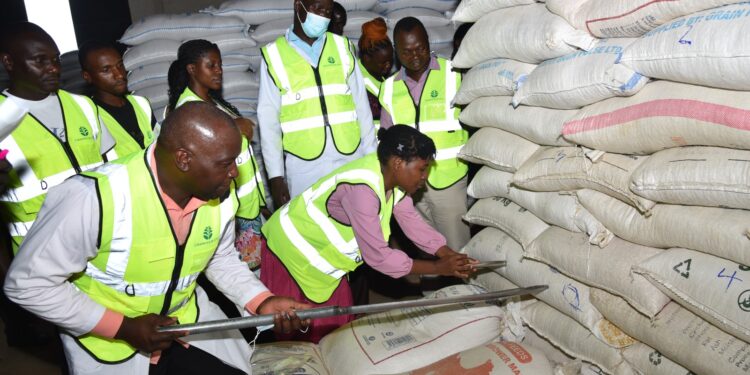(3 Minutes Read)
In a major policy shift aimed at improving food safety and enhancing the quality of its grain exports, the Uganda National Bureau of Standards (UNBS) has announced new mandatory requirements for all maize grain leaving the country. Beginning between July and September 2025, no maize grain will be permitted for export without a Quality (Q) Mark and a Sanitary and Phytosanitary (SPS) permit.
The announcement was made by Patricia Bageine Ejalu, Deputy Executive Director for Standards at UNBS, during a training session for small and medium enterprises (SMEs) held at the UNBS headquarters in Bweyogerere. She emphasised that this move is designed to eliminate the market for substandard grain products and to give Uganda more control over the quality and value of its agricultural exports.
“When we stop substandard grain from being sold, buyers will be compelled to source from certified premises,” Ejalu stated. “This is about protecting our markets and ensuring that our produce meets acceptable standards.”
The directive is part of a broader government strategy to combat food loss, restore confidence in Uganda’s grain exports, and ensure compliance with international safety standards, particularly amid growing concerns over aflatoxin contamination, a recurring issue that has tarnished the country’s reputation in regional and international grain markets.
Ejalu pointed out that Uganda must stop the practice of exporting raw agricultural produce to neighbouring countries for processing, only to import it back at higher prices. She stressed the importance of value addition within Uganda, noting that many businesses in the country are already successfully processing their grain domestically. “We cannot allow our neighbours to process our food and sell it back to us. That’s unacceptable. Value addition can and should be done here in Uganda,” she said.
Although the policy was initially slated for rollout in February 2025, Ejalu explained that the implementation was postponed to allow for additional staff training and capacity building within the UNBS. “The delay was necessary to ensure that our team is fully equipped to enforce these new standards,” she added. “We are now targeting the first quarter of the next financial year—between July and September—to officially launch.”
The announcement was made during a joint training session organised by UNBS and the East African Grain Council (EAGC), targeting 25 SMEs engaged in the grain sector. The training focused on safe grain handling, sampling, testing, and grading, all essential skills for maintaining grain quality throughout the supply chain.
Ejalu emphasised the critical need for improved post-harvest handling practices, pointing out that aflatoxin contamination usually occurs after harvesting, primarily due to poor storage and processing conditions. “Our maize grows very well, but once harvested, it’s often mishandled. Dirty storage, improper drying, and unhygienic milling conditions are the main culprits behind aflatoxin buildup,” she said.
She didn’t shy away from criticising the unsanitary conditions found in some milling facilities, describing them as dangerous to public health. “Some maize is milled in places that haven’t been cleaned in years. Dirt from the roof and floor ends up in the final product,” Ejalu warned.
Read Also;
https://trendsnafrica.com/ghana-and-uganda-impose-ban-on-food-exports/
Despite the challenges, Ejalu noted that food safety doesn’t require perfection, but rather consistent adherence to basic hygiene and quality practices. “Food isn’t medicine—it won’t go directly into your bloodstream—but it still needs to be safe. Simple measures like regular cleaning can make a huge difference,” she concluded.
This bold regulatory step reflects Uganda’s growing commitment to enforcing standards in its agricultural sector and aligns with national efforts to promote export competitiveness, food security, and public health.





